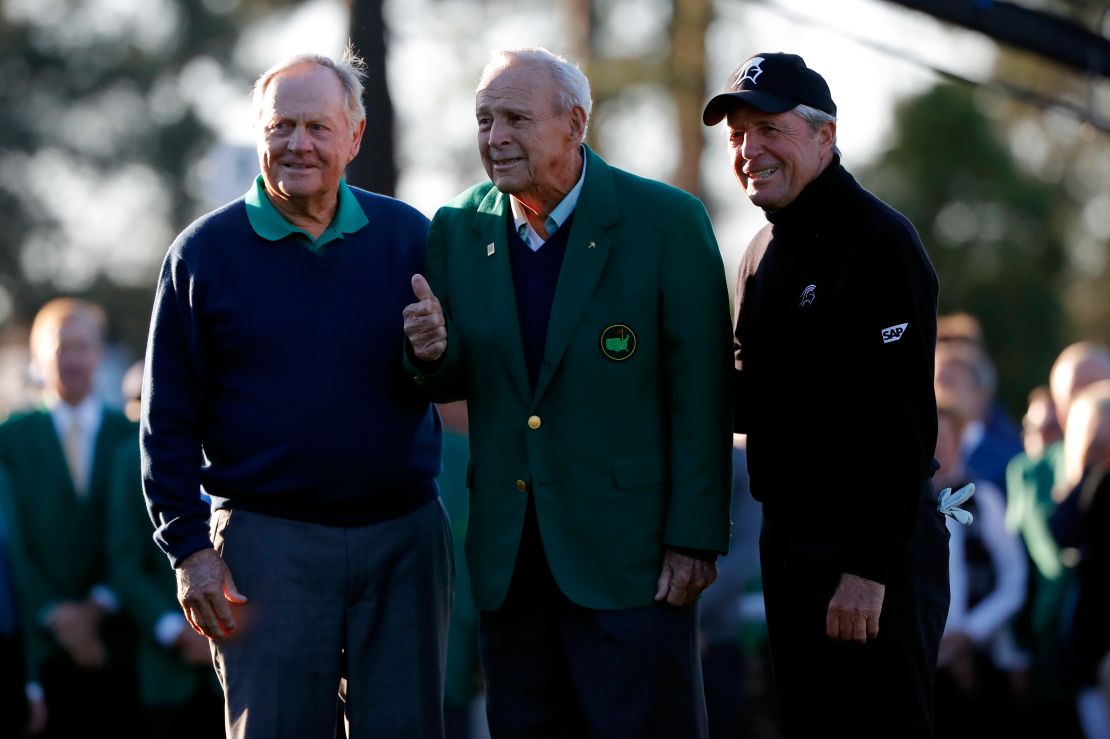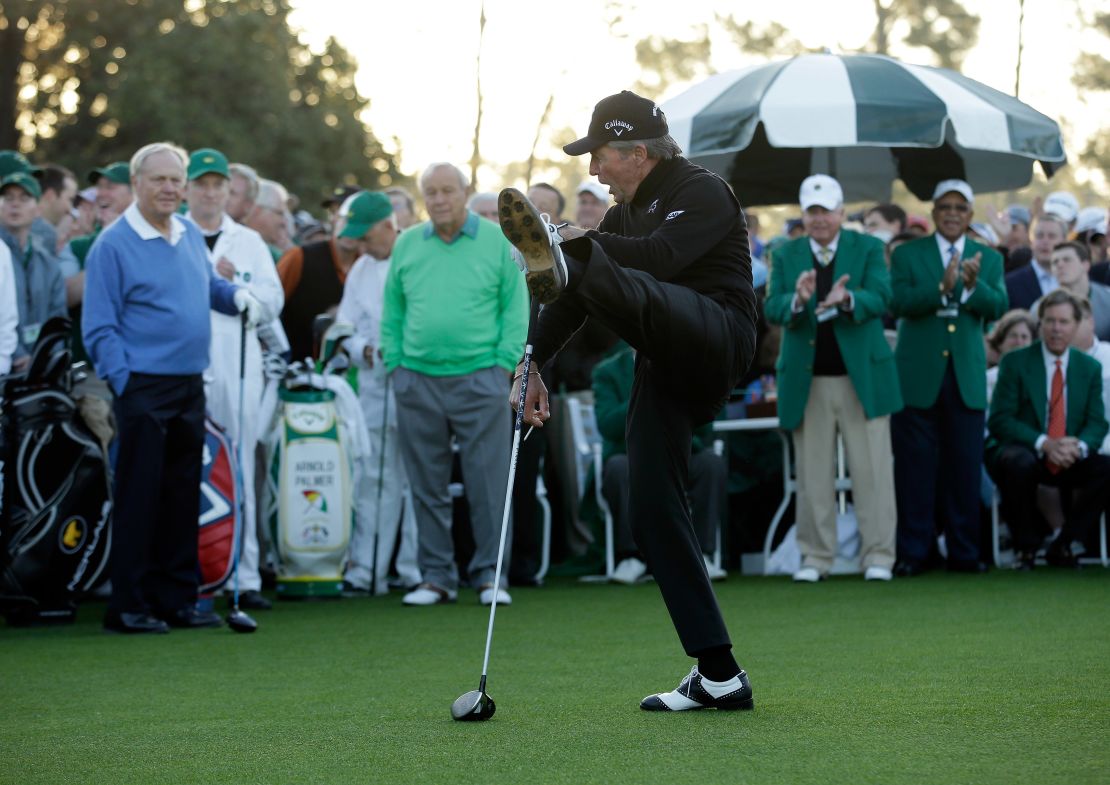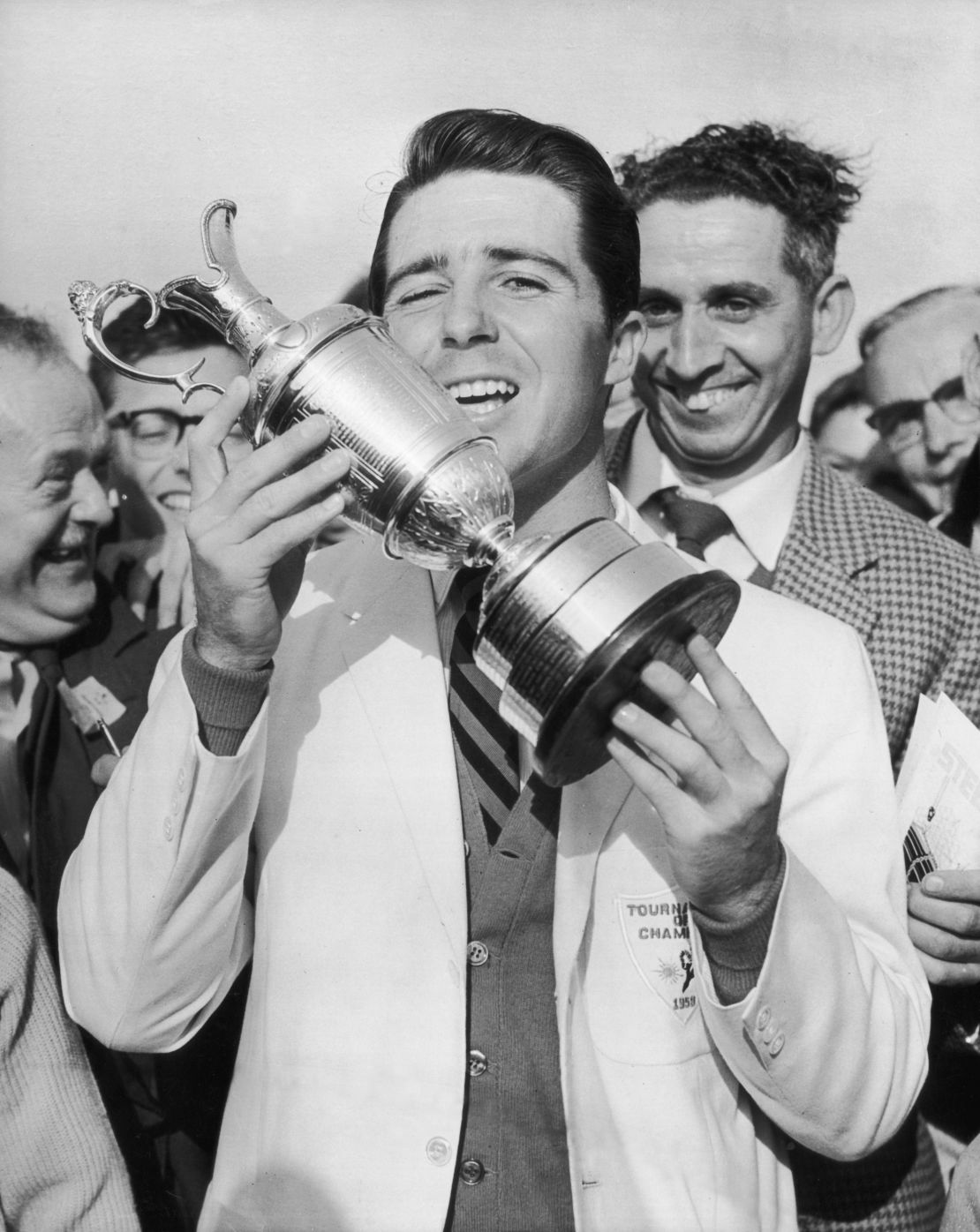Gary Player can still feel the moment the Masters green jacket was placed on his shoulders for the first time, way back in 1961.
Arnold Palmer, the man who did the honors that day, spent the rest of his career trying to forget about it.
Watch the grainy Pathé highlights – replete with lavish orchestral score – and you’ll notice a distinct lack of love between two young rivals who would become friendliest of foes.
We’re often told that sport meant less in the old days, but to those two, the Masters meant everything.
To Player, it always will.
“The fact is, Arnold was not happy for me,” Player told CNN Sport, when asked if Palmer was magnanimous in defeat.
“He struggled to really congratulate Jack [Nicklaus] or myself whenever we beat him. No-one wants to lose. It hurts. We loved each other, but we also wanted to beat the hell out of each other.”
READ: McIlroy, Mickelson, Spieth target grand slam elite

That final round at Augusta, 57 years ago, boiled down to a tale of two bunker shots. Player had swashbuckled his way to a four-stroke lead after 54 holes, but a sketchy back nine on Monday (play had been washed out on Sunday), including a seven at the par-five 13th, had handed Palmer the initiative.
After his approach at 18, Palmer accepted a congratulatory handshake from a friend in the gallery, only to discover his ball had finished in the sand.
Palmer eventually got down in double-bogey six, handing Player – who got up and down from the very same bunker for a par – the tournament by a single shot.
“Arnold was becoming an American icon, was the defending champion, and there had been no back-to-back winner of the Masters,” says the 82-year-old South African, the first non-American to win the tournament and whose only supporters that day were his wife Vivienne, a few friends and his dog.
“He was ‘their’ guy and nobody gave me a chance. Nobody except my family and a few friends really cared. But I was sure I was going to win, and the more they cheered for him, the more determined I would become.
“Only Arnold knows what was going through his mind when he started celebrating before it was all over. But I thrived on being the underdog.
“I took down Arnold Palmer in his home country against all the odds.”
Player calls his memories “the cushions of life,” which might explain why he’s such a splendidly sprightly octogenarian, who still does thousands of sit-ups a day and could do plenty of damage with one of his trademark kung fu kicks.
Scattered and plumped up, those memories must make life very comfortable.
READ: Rory McIlroy: the Holywood star with the box-office appeal

His first Masters appearance was in 1957, his father having written a letter to Augusta National chairman Clifford Roberts asking for an invitation for his 21-year-old son, a virtual unknown.
Roberts replied: “Tell him to pack his bags.”
“I don’t know if it’s the smell or how every little detail is taken into account,” says Player, “but I felt compelled to stop at the top of Magnolia Lane and just walk down by myself. Gratitude filled my heart. No doubt, this was a monumental challenge.
“But I came to the Masters to win, to become a world champion. And if you want to be a champion, you cannot be intimidated.”
Player finished tied for 24th in his first Masters and won the first of three Open Championships in 1959, before that first victory in Augusta two years later.
“I cherish everything about [his 1961 Masters win] to this day. There was the kiss my wife Vivienne gave me during the ceremony, because it was for her and our family. Then there was dinner with Arnold and President Eisenhower.

“I will never forget what President Eisenhower said to me: ‘Gary, I am a great believer in freedom, as long as you don’t go over the brink of freedom and into the category of lack of discipline.’ We had a very special evening together.”
When Player returned to Johannesburg, there was a parade at the airport, at which his father Harry – a proud, rugged man who worked down a gold mine for 40 years – “wept like a baby.” Player calls his father’s place of work “that damn dungeon,” which might explain why Player never stops moving.

At the following year’s Champions Dinner, Player was seated next to the great Bobby Jones, seven-time major winner in the amateur era and founder of Augusta National. Jones was riddled with arthritis, so Player had to cut his steak.
When a menu was passed around for the players to sign as a prize, Ben Hogan, a two-time Masters champion in the 1950s and another all-time great, took exception.
“He slammed those iron fists down on the table,” says Player, “and shouted in a booming voice, ‘This is the Masters Dinner, not a goddam autograph session.’ That gave me quite a shock. Today, it’s exactly that.”
READ: Tiger Woods sparks 181% TV ratings boost

The player known as the “Black Knight” would win two more green jackets in the 1970s, but it is that first triumph, which demonstrated that even a living American legend could be slain in his own domain, that did most to make golf a global concern.
“Masters champions are now from countries all over the world,” says Player, who was 73 when he competed in his 52nd and final Masters tournament in 2009. “They looked at me and thought, ‘If he can do this, why can’t we?’ I encouraged as many players as I could, and still do now.”
When Player arrives at Augusta, he always walks down Magnolia Lane and says a prayer of thanks. He will continue to do so, as long as he is able. And even in his dotage, he’ll be able to plump up those pillows and be transported.
Visit CNN.com/gofl for more news, features and videos
“Even if I was blind, I would know exactly where I was,” says Player. “It’s the sound of the patrons, the smell of the flowers, the wind in the trees …”
